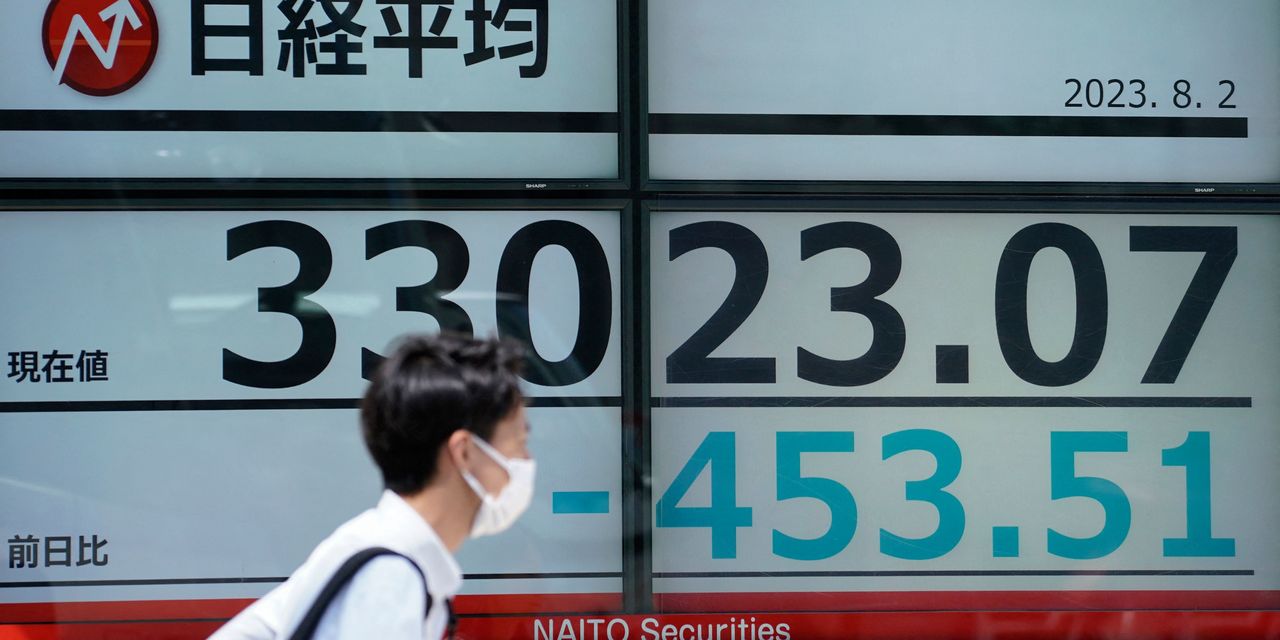TOKYO — Asian shares dipped Wednesday after Wall Street took a step back from its big rally as markets tried to digest a slew of earnings.
Japan’s benchmark Nikkei 225
JP:NIK
dove 1.8% in morning trading. Australia’s S&P/ASX 200
fell 0.8% while South Korea’s Kospi
KR:180721
slid 1.4%. Hong Kong’s Hang Seng
dipped 1.9%, while the Shanghai Composite
CN:SHCOMP
lost 0.8%. Benchmark indexes in Singapore
SG:STI,
Taiwan
TW:Y9999
and Indonesia
ID:JAKIDX
fell.
On Wall Street, the S&P 500
SPX
lost 12.23, or 0.3%, to 4,576.73, coming off its fifth straight winning month. The Nasdaq composite
COMP
sank 62.11, or 0.4%, to 14,283.91. The Dow Jones Industrial Average
DJIA
squeezed out a gain of 71.15 points, or 0.2%, to 35,630.68 even though most of the stocks within it weakened.
Worries have been broadly rising that expectations have built too high for the entire U.S. stock market after the S&P 500 surged more than 19% so far this year. Stocks had leaped to a 16-month high on hopes inflation is cooling enough to get the Federal Reserve to stop hiking interest rates. That in turn could allow the economy to avoid a long-expected recession.
While inflation has indeed come down since the summer and the economy has remained remarkably resilient, critics say it’s no guarantee inflation will continue to cool at the same rate. They say stock prices have risen too far, too quickly.
Reports on the economy Tuesday came in mixed. The number of job openings advertised across the country dipped slightly in June, when economists were expecting a rise. But the job market broadly remains solid, propping up the rest of the economy and keeping it out of a recession so far.
One report on the manufacturing industry from the Institute for Supply Management said it contracted at a slightly worse pace in July than economists expected, but not as badly as it did in June. A separate report from S&P Global also said U.S. manufacturing is continuing to decline.
“However, producers are clearly shrugging off recession fears and planning for better times ahead,” said Chris Williamson, chief business economist at S&P Global Market Intelligence.
In the bond market, the yield on the 10-year Treasury rose to 4.03% from 3.97% late Monday. It helps set rates for mortgages and other important loans.
In energy trading, benchmark U.S. crude
CLU23,
rose 93 cents to $82.30 a barrel. Brent crude
BRNV23,
the international standard, gained 92 cents to $85.83 a barrel.
In currency trading, the U.S. dollar
USDJPY,
edged up to 143.21 Japanese yen from 142.83 yen.
Read the full article here



